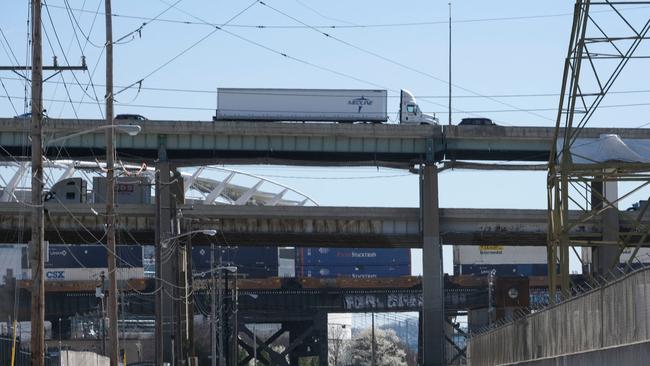The nuts and bolts of rebuilding America
Roads, bridges, high-speed internet, education, energy transition and climate protection: Joe Biden’s twin plans to rebuild the US.

Joe Biden’s twin plans to rebuild the US include spending on roads, bridges, high-speed internet, education, energy transition and climate protection.
Infrastructure plan
The $1.2 trillion ($1.6 trillion) plan provides for the construction, modernisation and maintenance of thousands of kilometres of roads, bridges, dams, locks on rivers and canals, as well as the construction of cycle paths and footpaths, and investments in airport projects.
Passenger rail transport would be modernised, including the creation of new links between cities, some of it by high-speed train.
High-speed internet access, which is expensive in the US, would be extended to rural areas, with new regulations to lower prices or help families who cannot afford it. Thousands of kilometres of new power lines would be built, with energy produced from renewable sources. Investments are also planned in new technologies such as CO2 capture, “clean hydrogen” and nuclear energy.
The bill also contains provisions to clean up areas contaminated by toxic waste, abandoned mining land and used gas wells that have not been properly sealed up, as well as replacing water pipes that contain lead.
The plan will finance measures to reduce greenhouse gas emissions and mitigate the impact of climate change by improving communities’ adaptability to natural disasters such as fires, floods and hurricanes. America’s famous yellow school buses would go zero-emission and a national network of charging stations developed to stimulate the electric vehicle market. Finally, the bill includes measures to safeguard against cyber attacks, which have recently targeted the distribution of fuel and other companies.
Build Back Better
Costing at least $1.75 trillion, the bill provides free preschool for all children aged three and four, and would limit childcare costs to no more than 7 per cent of a household’s income.
The current child tax credit would be extended for households earning up to $US150,000 a year. It offers parental leave or leave for family for medical reasons of four weeks.
“Resilience” investments are planned to cope with extreme weather events such as forest fires, droughts and hurricanes.
The package includes tax credits for green energy to cover the production, transport and storage of renewable energies, as well as the production of so-called “clean” vehicles for private and professional drivers. Targeted incentives would stimulate technological innovation in solar energy, batteries and advanced materials.
The plan proposes extending tax credits on health insurance options for the most disadvantaged. Medicare, a public health insurance system for people over 65 and those with lower incomes, would cover the costs of hearing care and could negotiate drug prices with pharmaceutical companies. Shortages of housing, including in rural areas, would be tackled with building more than a million houses for rent, plus assistance for rent payment and mortgages.
AFP


